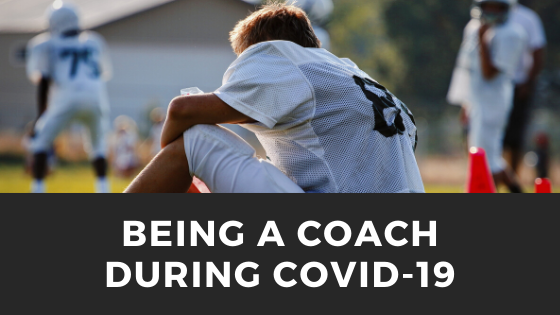With the cancellations of events, the closing down of schools, and the postponing of entire sports leagues, many athletes and coaches are left without answers. The shock and disbelief that comes with an unprecedented event like this is similar to that of a career-ending injury. It is crucial that coaches are reaching out and supporting athletes.
The season is going along at its regular pace with practices and games, then the unexpected happens. The sport you have poured blood, sweat, and tears into, the group that you developed a bond with, and the family you have created is ripped away from you — with zero opportunity for closure in your season.
As a coach or athlete, it can be difficult to know the best way to cope and assist others during this time. Here are some tips that I have been using with my athletes as we are working together through this unique time.
Actually Listen
When I work with athletes the number one rule is to listen. I have to be able to hear what they are saying, understand the themes of what the group talks about, and know what exactly they believe is important right now. The only way to reach your athletes to connect with them.
Now more than ever athletes need someone to hear and listen to them. The situation of having your season cut short due to a global pandemic is incredibly unique. As a coach you cannot even think of uttering the words, “I know how you feel.” You don’t. This is the time where you have to let your athletes find the words to tell their story.
I have spoken with athletes through video calls and texts to find out how they are doing with the news that their season has been canceled.
Each athlete I have talked to has had a different reaction. You cannot assume you know how your athlete feels.
Listen for exactly how your athletes are interpreting the situation. Some may feel the world is crashing down around them while others may not have any type of reaction at all. Each person will be different in how they understand this situation.
Even if you find that your athlete has a negative, toxic mindset about the season ending, it’s crucial to hear them out first. You will need to know exactly where they are coming from to help them adjust towards a more productive and positive mindset.
Stay Connected
Remember to stay connected! There isn’t an athlete out there who wouldn’t appreciate their coach or teammate checking in on them. Take the time to send a text, let your athletes know you’re thinking of them. Offer to provide some home workouts, books, videos, or other resources for the athletes to stay connected to you, the team, and the sport.
I have worked with coaches who tend to shy away from the team when things get challenging. These coaches fear “doing the wrong thing” or “saying something to make it worse.” The worst thing you can do is not talk to your team right now. When the leader doesn’t say anything, the group is left to fill in the gaps. The team will make assumptions, and those assumptions will more than likely be detrimental to the future of your group.
Validate the Emotions
As you listen to your athletes, notice any emotions or feelings they bring up. Each athlete will react differently, it will be your job to support them in their experience. Assure them that their reaction is normal.
The feelings are there for a reason. Feelings of anger, sadness, shock, grief, are all related to the athlete caring about their sport. Pushing these emotions away will create a larger issue in the future. If your athlete is comfortable, they will process these emotions with you. Consider bringing in a Sport Psychology Professional to talk with your group through online services or in person when safe to do so.
If you’re worried about these emotions persisting or developing into a more serious case, consider providing resources to local mental health options. When working with collegiate athletes, college campuses offer free counseling to students. At this time, they are likely providing distance and online services through phone or video chat.
Control the Controllables
A common reaction is to want to blame someone or something. This is due to the lack of control an athlete feels at this time. They did not get to decide when their season ended. They didn’t get to finish out and play the meaningful games as the season winds down. There is an overwhelming sense of being at the mercy of others.
However, looking at all of the factors outside of the athlete’s control is a waste of time and energy.
I have heard my athletes; I have validated their emotions. It’s time to shift their energy and attention to a more productive outlet.
I use their language to help them move their focus back to what they can control.
For example, I am currently working with a sophomore athlete who has repeatedly talked about how much he felt he had improved this year. The athlete talked about how he felt he was going to be a starter and be a big part of the team’s potential success. He was stuck in a pattern of saying, “What if…” What if this year we could have gone all the way?
I reminded him that unfortunately, we will never know what could have come from this season. If he spends his time thinking about all the “what ifs” there will be no positive outcome. Instead, he will benefit from looking at the few things he can control. I told him exactly how he gets to decide what happens next. He can control his attitude, effort, attention, and response to this situation.
Find the Opportunity
When athletes have shifted their mindset to what they can control, they can find purpose and meaning and seize opportunity.
The great athletes who make a mark on the athletic world are the ones who find a way to improve despite the circumstances. Encourage your athlete to continue on the path of improvement. To shift away from the negativity or despair and make the conscious decision to become better.
Given the nature of COVID-19, this does not mean putting yourself in harmful situations. There will always be methods to improve without taking on any unnecessary risk.
As a coach, provide your athletes with specific methods to improve. This means taking the time to research and provide your athletes with updates regularly. Be a role model by seeking out information and sharing it:
- Send out regular home workouts
- Design sport-specific workouts for your athletes
- Suggest reading materials (blog posts, articles, books)
- Find sport psychology and/or motivation podcasts
- Send links to videos on sports and improving
- Encourage mental skills training
Coaches, including myself, want athletes to improve. My goal is for athletes to constantly be looking for ways to take their game to the next level. I cannot expect my athletes to do it if I do not do the same for myself. Personally, I am consistently learning about the best ways to work with my athletes and how to improve my knowledge of the sport. By walking the walk, I am demonstrating how to positively handle unexpected adversity.
Considering Seniors
Working with a senior who does not have the chance to come back can be particularly challenging. Their athletic career has ended without any real closure. Many of these strategies still apply such as listening, staying connected, and validating emotions. However, there is a difference when it comes to looking forward and future focus.
Rather than looking at improvement to come back to the sport, the athlete will benefit from a looking at a wider picture. I work with my athletes to identify their personal “why.” What was the purpose of their athletic career and how can they look to sharing their why beyond the sport?
Bring this purpose and their personal why into the future. Many athletes love the grind of pushing themselves, competition, and constant improvement. These factors are not limited to sport and can be translated into business, hobbies, and academics. Work with your athlete to translate their skills into their future.
Identity
Explore how they are more than just an athlete. Many athletes struggle to move on from sport because they have always thought of themselves as an athlete. Often, they are known by their friends, family, classmates as the athlete.
For example, I played hockey and always thought of myself as a hockey player. I was known as a hockey player, that’s what I did more days than not. When my hockey career ended before my senior year, it was a challenge to rediscover how I labeled myself. The label that I had been attached to for the majority of my life no longer applied anymore.
Look to see what other roles your athlete has. I work with athletes to write out all of their roles. Many include student, brother/sister, son/daughter, teammate, classmate, colleague, coworker friend, significant other, and many more. This demonstrates how the athlete is more than just an athlete.
Set your athletes up to be successful. Having these discussions early will ease athletes as they move forward into the future. They will be more prepared for the next phase of life.
Conclusion
Coaches and team leaders, you have an opportunity to help your athletes navigate this difficult time in their athletic careers. Be the person who can help guide during times of adversity. Do not forget that your athletes look up to you, respect your decision, and will look to you for example. Embrace the opportunity you have in front of you as you would want you athletes to do.
Help your athletes process and adjust by being intentional and connecting with each of them.




This Post Has One Comment
Great that you are using your expertise and understandsing to help with this viru
Comments are closed.